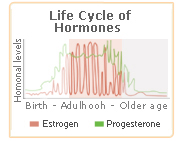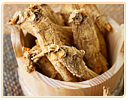Ginseng and Menopause
 Menopause symptoms affect 70% of women in their early 40s and sometimes last beyond menopause. Such symptoms occur due to an increasing imbalance in hormone levels. Symptoms range from fatigue to vaginal dryness, and can cause a mixture of mild discomfort, embarrassment, and pain for sufferers. Menopause symptoms affect 70% of women in their early 40s and sometimes last beyond menopause. Such symptoms occur due to an increasing imbalance in hormone levels. Symptoms range from fatigue to vaginal dryness, and can cause a mixture of mild discomfort, embarrassment, and pain for sufferers.
Ginseng can help ease these symptoms in various ways. As a phytoestrogenic herb, ginseng is capable of rebalancing menopausal women’s hormone levels, and it does this by replacing lost hormones with human-like, estrogenic ones.
 Ginseng contains the unique chemical compound ginsenosides. Extensive clinical studies claim that it’s this compound that provides ginseng’s healing properties. Such healing properties are known to revitalize and reinvigorate the body and ginseng is often used by women to lessen some of the more painful symptoms of menopause. Ginseng contains the unique chemical compound ginsenosides. Extensive clinical studies claim that it’s this compound that provides ginseng’s healing properties. Such healing properties are known to revitalize and reinvigorate the body and ginseng is often used by women to lessen some of the more painful symptoms of menopause.
Ginseng Can be Used to Help ease the Following Symptoms:
 Fatigue: Fatigue is a common symptom of menopause. Women experience general weakness, tiredness, and a lack of energy. As an adaptogen, ginseng is medically proven to counteract the effect of fatigue, and traces of ginseng are often used in energy drinks due to this effect. Fatigue: Fatigue is a common symptom of menopause. Women experience general weakness, tiredness, and a lack of energy. As an adaptogen, ginseng is medically proven to counteract the effect of fatigue, and traces of ginseng are often used in energy drinks due to this effect.
Vaginal Dryness: This symptom occurs when the walls of the vagina begin to lose the soft inner lining, as a direct result of a drop in estrogen levels. This can cause rashes and irritation, and may make sex uncomfortable. It may also make a woman more susceptible to infections.
The lowering of estrogen also causes the vagina to become less elasticated and it can take longer to become lubricated. The ginsenosides found in ginseng have an estrogen-like effect on vaginal walls which prevents the tissue from thinning, and this helps treat vaginal dryness.
 Disturbing Memory Lapses: At some point, everyone forgets things in day to day life. During menopause, memory losses can occur very frequently. Losses in short to long-term memory range from forgetting about the placement of simple household items to forgetting the dates of important occasions. Such a mental state is caused by an increase in stress levels. Ginseng, when combined with the herb ginkgo, has been proven to stimulate mental capacity. Disturbing Memory Lapses: At some point, everyone forgets things in day to day life. During menopause, memory losses can occur very frequently. Losses in short to long-term memory range from forgetting about the placement of simple household items to forgetting the dates of important occasions. Such a mental state is caused by an increase in stress levels. Ginseng, when combined with the herb ginkgo, has been proven to stimulate mental capacity.
 Increase in Allergies: During menopause allergies are related to hormonal changes and so women will suffer allergies more acutely. Such a reaction begins when hormones levels drop drastically; that is, when women enter menopause. As a booster to the immune system, ginseng can help women’s bodies fight off the spread of allergies, by empowering the cells which fight them. Increase in Allergies: During menopause allergies are related to hormonal changes and so women will suffer allergies more acutely. Such a reaction begins when hormones levels drop drastically; that is, when women enter menopause. As a booster to the immune system, ginseng can help women’s bodies fight off the spread of allergies, by empowering the cells which fight them.
Although ginseng has been proven to help women cope with some menopause symptoms, there are other, more common and difficult symptoms where ginseng can’t provide any help at all. The following list shows some menopause symptoms that ginseng can’t treat:
 • Hot Flashes • Hot Flashes
• Night Sweats
• Breast Tenderness
• Irregular Periods
• Mood Swings
Conclusions about Ginseng
Ginseng is great for alleviating some menopause symptoms, but has recently been criticized because it adds artificial hormones to the body. In so doing, ginseng can trigger side effects including serious problems such as breast cancer.
Other alternative treatments are just as effective as ginseng, but without the side effects. Non-estrogenic herbs, for example, are a great option for treating menopause symptoms. Read more in the following article.
Which herb should women try? Today women are looking for relief from their menopause symptoms with herbs. Phytoestrogenic herbs and non-estrogenic herbs are good in relieving menopause symptoms, but recent studies show that non-estrogenic herbs have no side effects because they help the body to produce its own hormones instead of introducing hormones like the phytoestrogenic ones. Learn more about non-estrogenic herbs for menopause. | 

